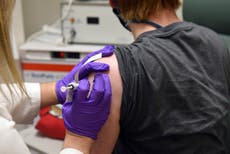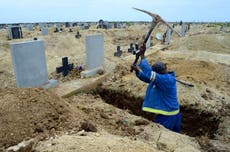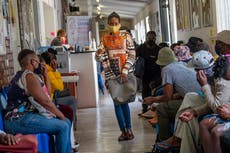Rich countries should scale up production of the coronavirus vaccine, not stockpile it
The Covid-19 vaccine will only make a difference if the world has access to it

Earlier this week, there was a public outpouring of emotion as Maggie Keenan, aged 90, was the first person to receive a Covid-19 vaccine in the UK. With effective vaccines coming to market, the end of the pandemic could be within our sight. But with rich countries hoarding enough doses to vaccinate their entire populations nearly three times over, there are real concerns that vulnerable groups in the rest of the world will be waiting years before they can access these vaccines.
Recent data shows that rich nations representing just 14 per cent of the world’s population have bought more than 50 per cent of all the most promising vaccines so far. This means that nine out of 10 people in lower-income countries are set to miss out on Covid-19 vaccine next year. The UK is one of the worst offenders of this vaccine hoarding, having potentially secured up to five doses per citizen.
But it shouldn’t be a trade-off on who should be getting the vaccine first – it's not about pitting Maggie in the UK against a healthcare worker in Malawi. The conversation that we need to have is how to scale-up manufacturing of Covid-19 vaccines so that enough safe and effective doses can be produced for the whole world to benefit.
Scaling-up manufacturing of Covid-19 vaccines, as well as tests and treatments, requires pharmaceutical companies to give up their monopolies, to share their intellectual property rights and to share the knowledge of how these tools can be produced. This will not only speed up research and development and maximise manufacturing capacity, it will also make products more affordable by enabling generic competition to help drive down prices. Rather than governments fighting to get a bigger slice of the pie, Big Pharma should share the recipe.
With growing alarm that low-income countries will be denied wide access to vital health tools to combat the pandemic, India and South Africa have been urging the World Trade Organization (WTO) to allow all countries to choose to neither grant nor enforce patents related to Covid-19 health technologies, until global herd immunity is achieved. The aim of this proposal – now supported by 100 countries – is to prevent intellectual property barriers from restricting access to Covid-19 health technologies and to ensure all health systems are equipped with the tools they need to end this pandemic.
On Thursday WTO members are meeting to discuss whether to adopt this landmark proposal. One would’ve thought that during a pandemic, all countries would be supporting this commonsense solution that will help ensure that all countries can access the suite of medical tools needed to beat the pandemic.
Shamefully, the UK is among the list of rich countries opposing this proposal. Considering our government has already secured the equivalent of five doses per citizen, surely we have a moral duty to lower barriers for lower-income countries to also get access – not fight to keep them.
To explain their lack of support, the UK government is arguing that barriers to accessing Covid-19 tools caused by pharmaceutical company monopolies are “hypothetical”. This assertion ignores the alarming evidence from countries across the world who have been unable to access Covid-19 tests and treatments because of the industry’s intellectual property rights. Countries, such as South Africa, have faced challenges accessing adequate testing materials to scale up Covid-19 testing due to intellectual property on some machines and reagents.
Even here in the UK, during the autumn, a potential Covid-19 treatment was rationed due to inadequate supply. It has been priced at £1,802 for a five-day course in most countries by drug maker Gilead Sciences. It is a prohibitively high price for many health systems, even though the treatment course can be manufactured for as little as £6.93.
The situation will be even worse when it comes to vaccines. Seeing Pfizer / BionTech’s vaccine starting to be rolled out across the UK gives me great hope that we could be turning the tide on the pandemic. But this vaccine is only going to make a difference if we can secure global access to it – the virus uncontrolled anywhere is the virus uncontrolled everywhere. So far, 96 per cent of Pfizer/BioNTech’s vaccine has been acquired by rich countries. Pfizer has also stated their intention to make a profit and enforce intellectual property rights. Without governments taking action, this will be a vaccine just for the rich.
The UK government is rightly supporting some global initiatives to help countries get access to Covid-19 vaccines, like the Gavi and WHO-led COVAX Facility. But with rich countries already scooping up a majority of vaccine doses, with COVAX being last in the queue, it's in danger of failing. COVAX will always struggle to find enough doses to purchase because pharmaceutical companies are unwilling to lift their patents and share their technology so more doses can be made.
We are in a highly fortunate and privileged situation in the UK with Covid-19, with vaccines starting to be rolled out this week. It would be a callous act to now use our position to create barriers for lower-income countries to do the same. At Thursday’s WTO meeting, let’s hope our government stands on the right side of history.
Clive Lewis is the Labour MP for Norwich South






Join our commenting forum
Join thought-provoking conversations, follow other Independent readers and see their replies